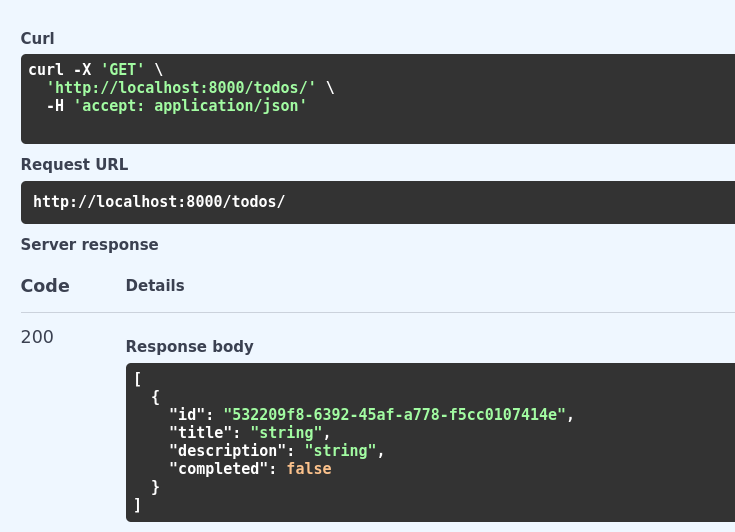Have you ever wanted to run Couchbase on Docker to freely build and test your app?
Here’s a simple guide to help you set up Couchbase in Docker and build a sample TODO app using Python and FastAPI.
Developer Cluster Setup
First, let’s create a minimal docker-compose.yml file to spin up Couchbase:
services:
couchbase:
image: couchbase:latest
container_name: couchbase
ports:
- "8091:8091" # Couchbase Web Console
- "8092:8092" # Query Service
- "8093:8093" # Full Text Search
- "11210:11210" # Data Service
environment:
COUCHBASE_ADMINISTRATOR_USERNAME: admin
COUCHBASE_ADMINISTRATOR_PASSWORD: password
volumes:
- couchbase_data:/opt/couchbase/var
- ./init_bucket.sh:/init_bucket.sh
- ./start-couchbase.sh:/start-couchbase.sh
# get the image entry point using docker inspect -f '{{.Config.Entrypoint}}' couchbase
# for the current image is /entrypoint.sh
command: ["/bin/bash", "/start-couchbase.sh"]
mem_limit: 1024m # Limit memory usage to 3100 MB for full
volumes:
couchbase_data:
To make it work, we need two shell scripts: start-couchbase.sh and init_bucket.sh.
The first script (start-couchbase.sh) starts Couchbase in the background and then runs the cluster and pool initialization script (init_bucket.sh).
Here is start-couchbase.sh:
#!/bin/bash
# Start Couchbase Server in the background
/entrypoint.sh couchbase-server &
sleep 5
# Wait for Couchbase to be available
echo "Waiting for Couchbase to be ready..."
until curl -s http://localhost:8091/pools > /dev/null; do
echo "Waiting for Couchbase server to start..."
sleep 5
done
# Run the initialization script
echo "Couchbase is up! Running init script..."
./init_bucket.sh
# Wait for Couchbase Server to keep the container running
wait
And here is init_bucket.sh:
#!/bin/bash
echo "Starting init..."
# Wait until Couchbase server is ready to accept requests
echo "Waiting for Couchbase to be ready..."
until curl -s http://localhost:8091/pools > /dev/null; do
echo "Waiting for Couchbase server to start..."
sleep 5
done
# Create the cluster
echo "Creating the cluster..."
curl -v -X POST http://localhost:8091/clusterInit \
-d "indexPath=%2Fopt%2Fcouchbase%2Fvar%2Flib%2Fcouchbase%2Fdata" \
-d "eventingPath=%2Fopt%2Fcouchbase%2Fvar%2Flib%2Fcouchbase%2Fdata" \
-d "analyticsPath=%2Fopt%2Fcouchbase%2Fvar%2Flib%2Fcouchbase%2Fdata" \
-d "javaHome=" \
-d "sendStats=false" \
-d "clusterName=DockerCluster" \
-d "services=kv%2Cn1ql%2Cindex" \
-d "memoryQuota=512" \
-d "afamily=ipv4" \
-d "afamilyOnly=false" \
-d "nodeEncryption=off" \
-d "username=admin" \
-d "password=password" \
-d "port=SAME" \
-d "indexMemoryQuota=256"
# For Full Add:
#-d "services=kv%2Cn1ql%2Cindex%2Cfts%2Ceventing%2Ccbas%2Cbackup" \
#-d "eventingMemoryQuota=256" \
#-d "ftsMemoryQuota=256"
echo "Creating the pool..."
curl -X POST http://localhost:8091/pools/default \
-u admin:password \
-d memoryQuota=512 \
-d indexMemoryQuota=256
# FOR Full add:
#-d eventingMemoryQuota=256 \
#-d ftsMemoryQuota=256 \
echo "done"
# Create the bucket
BUCKET_NAME="myBucketTest"
BUCKET_QUOTA=100 # Size in MB
# Create the bucket using Couchbase REST API
curl -X POST http://localhost:8091/pools/default/buckets \
-u admin:password \
-d name=$BUCKET_NAME \
-d ramQuota=$BUCKET_QUOTA \
-d authType=sasl \
-d bucketType=couchbase
echo "Bucket '$BUCKET_NAME' created successfully."
These settings initialize a developer Couchbase cluster with only the KV (Data Service), N1QL (Query Service), and Index (Index Service) enabled.
Sample python app
Now for the fun part: let’s build a sample TODO app using Python and FastAPI.
Creating a bucket admin user
To create a new user and give a user admin rights on the bucket, add the following to init_bucket.sh:
USER_NAME="todoUser"
USER_PASSWORD="todoPassword"
# BUCKET_NAME="myBucket"
# Create the user using Couchbase REST API
curl -v -X PUT http://localhost:8091/settings/rbac/users/local/$USER_NAME \
-u admin:password \
-d password=$USER_PASSWORD \
-d name="Todo User" \
-d roles="bucket_admin[$BUCKET_NAME],bucket_full_access[$BUCKET_NAME]"
echo "User '$USER_NAME' created with bucket_admin and bucket_full_access rights on bucket '$BUCKET_NAME'."
The Python app
First, let’s install the required packages:
pip install fastapi uvicorn couchbase
Next, create the Pydantic model (models.py) :
from pydantic import BaseModel
from typing import Optional
class TodoItem(BaseModel):
id: Optional[str]
title: str
description: Optional[str]
completed: bool = False
Now, build the FastAPI app (app.py):
import uuid
from couchbase.auth import PasswordAuthenticator
from couchbase.cluster import Cluster
from couchbase.options import ClusterOptions
from fastapi import FastAPI, HTTPException
from .models import TodoItem
app = FastAPI()
# Couchbase connection setup
cluster = Cluster(
'couchbase://localhost',
ClusterOptions(PasswordAuthenticator('todoUser', 'todoPassword'))
)
bucket = cluster.bucket('myBucket')
collection = bucket.default_collection()
# In-memory store for TODOs
todos = {}
# CRUD Operations
@app.post("/todos/", response_model=TodoItem)
def create_todo(todo: TodoItem):
todo_id = str(uuid.uuid4()) # Generate a unique ID
todo.id = todo_id
# Insert the TODO into Couchbase
collection.upsert(todo_id, todo.model_dump())
return todo
@app.get("/todos/", response_model=list[TodoItem])
def get_all_todos():
try:
# Use N1QL query to get all TODOs from Couchbase bucket
query = "SELECT meta().id, title, description, completed FROM myBucket"
rows = cluster.query(query)
todo_list = [TodoItem(**row) for row in rows]
return todo_list
except Exception as e:
print("Error retrieving TODOs: " + str(e))
raise HTTPException(status_code=500, detail="Error retrieving TODOs: " + str(e))
@app.get("/todos/{todo_id}", response_model=TodoItem)
def read_todo(todo_id: str):
try:
# Get the TODO from Couchbase
result = collection.get(todo_id)
todo = result.content_as[TodoItem]
return todo
except Exception:
raise HTTPException(status_code=404, detail="TODO not found")
@app.put("/todos/{todo_id}", response_model=TodoItem)
def update_todo(todo_id: str, todo: TodoItem):
try:
# Update the TODO in Couchbase
collection.upsert(todo_id, todo.dict())
return todo
except Exception:
raise HTTPException(status_code=404, detail="TODO not found")
@app.delete("/todos/{todo_id}")
def delete_todo(todo_id: str):
try:
# Delete the TODO from Couchbase
collection.remove(todo_id)
return {"detail": "TODO deleted"}
except Exception:
raise HTTPException(status_code=404, detail="TODO not found")
Run it all
Now we can finally run the app.
First, start the Couchbase server with:
docker compose up --build
Then, run the FastAPI app with:
uvicorn app:app --reload
And then open the browser to http://127.0.0.1:8000/docs and try it out.
If everything is set up correctly, you should be able to make API calls via FastAPI:

And see the results in the Couchbase Admin UI:

Documentation and links:
- Couchbase REST API - Initialize Cluster - https://docs.couchbase.com/server/current/rest-api/rest-initialize-cluster.html
- Couchbase REST API - RBAC - https://docs.couchbase.com/server/current/rest-api/rbac.html
- Couchbase Services Overview - https://docs.couchbase.com/server/current/learn/services-and-indexes/services/services.html